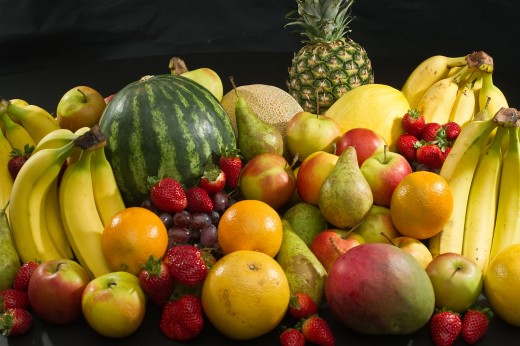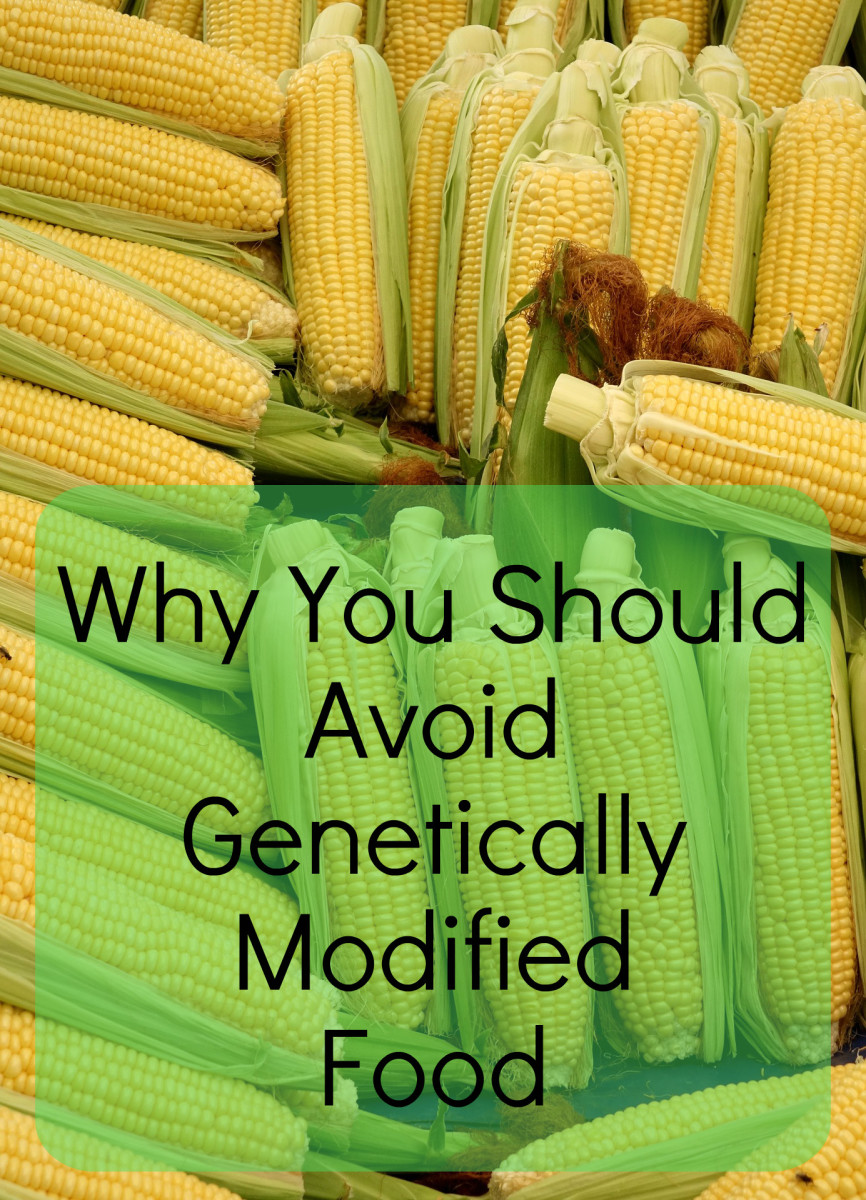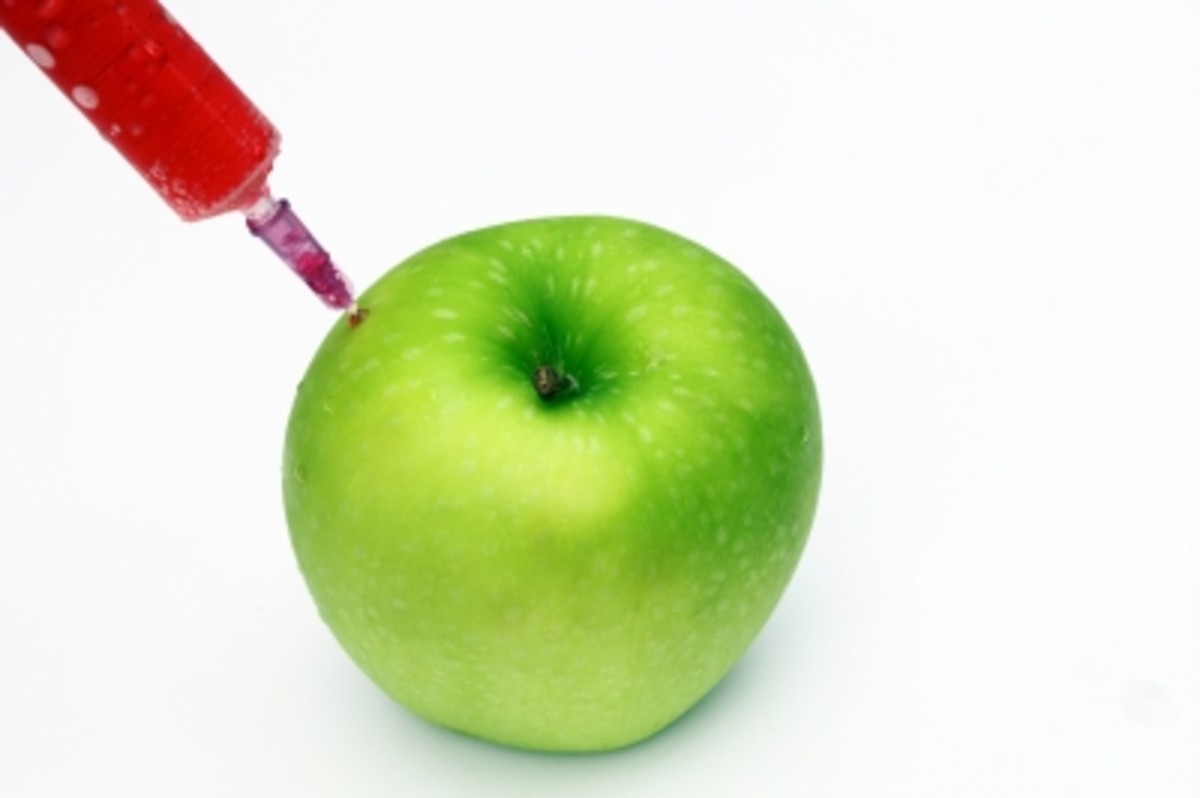Your Food Is Genetically Modified; and It's Not Safe

Genetically modified organisms first started in 1982, approved by the Food and Drug Administration. It is true that by these genetically modified organisms we are now able to produce bigger and better food. However, those food are unsafe and even harmful for people. According to the Non-GMO Project, “In more than 60 countries around the world including Australia, Japan, and all of the countries in the European Union, there are significant restrictions or outright bans on the production of GMOs.” (Lallanilla) This is because of all the health problems it could bring to people. Therefore, we should ban the use of GMOs.
Is your food safe? Well, you might think it is since there were no major problems while eating GM food. Actually, food safety experts found several possible human health issues such as food allergies, increase toxicity and decreased nutritional value. Since GMOs were introduced, the number of childhood food allergies had increased (Lim).
On the other hand, we have to acknowledge the fact that GMOs actually helped the development in our crops somehow. GMOs are used for agricultural uses such as making crops bigger, healthier and cheaper. The most typical example of a GM food is a banana. You’ve eaten a banana before, right? Bananas we eat these days are actually genetically modified. I’ve seen a banana before modification which was slightly different from what we know. When I studied about these organisms with several other people, we asked a group of students to draw what they think is a non-modified banana. They had no idea, which shows that most people don’t get to know and get informed about “original” food. The non-modified banana actually looks a lot different; it’s not soft as the bananas we eat today, and the color is green with seeds everywhere. Definitely not edible. However, not only bananas, 60% of what we eat today are dangerous (AlltimeConspiracies). In fact, most of its DNA is modified for agricultural purposes.
Not only that, GMOs are environmentally unfriendly. It harms the environment because it requires the use of pesticide and herbicide (Hsaio). Even though it is true that most crops use pesticides and herbicides, some GMOs led to an increase in herbicide usage. And you could see how this relates back to some of the health issues. Furthermore, when GM organisms interact with non GMOs and reproduce it will be very hard to recall if there is a problem with the modifications, and cause environmental issues. There would be a fitness advantage in the hybrid species, which will make them to be able to reproduce better. This might cause a loss of biodiversity in species and overpopulation of GMOs (Landry).
Due to the fact that GMOs have only come to our attention in recent years, the long term impacts and the extent of it being inherited is unknown. There are actual studies about GM food that happened on rats, and the results were negative. The rats had organ problems after being put on a GM food diet, and humans may experience the same effect in the long term. Genetically modified soy and corn were fed to them, and researchers found that a GMO diet often lead to liver and kidney problems, which could result in fatal diseases (GMO). Another study also shown organ damage, gastrointestinal and immune system disorders, accelerated aging, and infertility (Smith).
Last but not least, GMOs are immoral. Many people argue about how they are against the nature and that humans are trying to play against God. In fact, making a difference in an organism's genes could possibly cause imbalance in nature which is morally wrong.
As I mentioned before, putting people in a GM diet when we are not even sure with the actual health damages it could bring is not acceptable. Maybe consider studying and knowing properly about those organisms before we use them in real life. Should people’s health get threatened because of the development of science? Should people trust what scientists do to our nature without morality? Should we keep on changing genes to make better, but dangerous food? Nothing is more important than humans and the nature that is shaping us. Therefore, we should ban the production of GM food rather than offering something that is detrimental to health. Be aware of what you choose and be thoughtful of which is more significant.
Works Cited
AlltimeConspiracies. "How Dangerous Are GM Foods?" YouTube. YouTube, 20 Jan. 2015. Web. 09 Mar. 2017. <https://www.youtube.com/watch?v=dq9tfXNtyos>.
"GMO Seralini – Why This Study Now?" GMO Seralini. N.p., 21 Nov. 2012. Web. 09 Mar. 2017. <http://www.gmoseralini.org/faq-items/why-this-study-now/>.
Hsaio, Jennifer. "GMOs and Pesticides: Helpful or Harmful?" Science in the News. N.p., 24 Nov. 2016. Web. 09 Mar. 2017. <http://sitn.hms.harvard.edu/flash/2015/gmos-and-pesticides/>.
Lallanilla, Marc. "GMOs: Facts About Genetically Modified Food." LiveScience. Purch, 11 Jan. 2016. Web. 09 Mar. 2017. <http://www.livescience.com/40895-gmo-facts.html>.
Landry, Heather. "Challenging Evolution: How GMOs Can Influence Genetic Diversity."Science in the News. N.p., 12 Aug. 2015. Web. 09 Mar. 2017. <http://sitn.hms.harvard.edu/flash/2015/challenging-evolution-how-gmos-can-influence-genetic-diversity/>.
Lim, XiaoZhi. "Are GMOs Causing an Increase in Allergies?" Genetic Literacy Project. N.p., 24 June 2015. Web. 09 Mar. 2017. <https://www.geneticliteracyproject.org/2014/04/16/are-gmos-causing-an-increase-in-allergies/>.
Smith, Jeffrey. "10 Reasons to Avoid GMOs." Institute for Responsible Technology. N.p., 15 Jan. 2017. Web. 09 Mar. 2017. <http://responsibletechnology.org/10-reasons-to-avoid-gmos/>.
Young, Sandra. "GMO and the Nutritional Content of Food." Discovery Eye Foundation. N.p., 24 Mar. 2016. Web. 09 Mar. 2017. <http://discoveryeye.org/gmo-and-nutritional-content-of-food/>.








